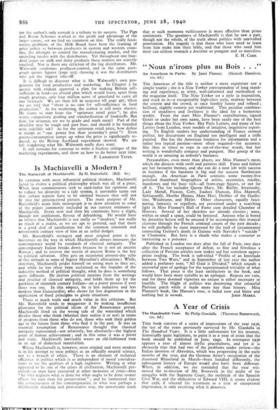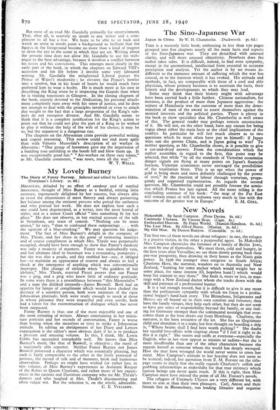A Year of Crisis
THIS book consists of a series of impressions of the year 1936, the last of the years previously surveyed by Mr. Guedalla in The Hundred Years. It is a little unfortunate for his attempt, historically quite legitimate, to paint it as a year of crisis that the book should be published in June, 1940. In retrospect 1936 appears a year of almost idyllic peacefulness, and yet it is obviously true that had two of the problems under review—the Italian invasion of Abyssinia, which was progressing in the early months of the year, and the German Army's occupation of the disarmed Rhineland in March—been handled differently, the subsequent history of Europe would also have been different. When, in addition, we are reminded that the year wit- nessed the re-election of Mr. Roosevelt in the midst of his struggles with the Supreme Court, the outbreak of the Spanish Civil War, and the abdication of Edward VIII, it seems evident that 1936, if selected for treatment as a year of exceptional importance, is only receiving what it deserves. But most of us read Mr. Guedalla primarily for entertainment. That, after all, is scarcely an insult to any writer and a com- pliment to all but a few. We hope to be able to sit back and watch an artist in words paint a background so brilliant that the figures in the foreground become no more than a kind of magnet to draw the eye to the scene in which they are set. Writing about the present time does not allow Mr. Guedalla to use his tech- nique to the best advantage, because it involves a conflict between his tastes and his convictions. This emerges most clearly in the early part of the book, in which the chapters on Edward VIII's accession and his life before it involve some very laboured writing. Mr. Guedalla the enlightened Liberal praises the Prince of Wales's modernity ; he elevates the Prince's bowler into a symbol, but in his heart of hearts he would much have preferred him to wear a busby. He is much more at his ease in describing the King when he is inspecting the Guards than when he is visiting tenements in Glasgow. In the closing chapters of the book, entirely devoted to the Abdication, his personal attach- ment completely runs away with his sense of justice, and he does not attempt to deal with the principles involved or even to attach due weight to the fact that a large proportion of the King's sub- jects do not recognise divorce. And Mr. Guedalla seems to think that it is a complete justification for the King's action to point out that he could not play the part of a King as he wished to play it without the help of the wife of his choice; it may be so, but the argument is a dangerous one.
The chapters on the Abyssinian crisis provide powerful writing and cogent reasoning. This review could not end more aptly than with Vittorio Mussolini's description of air warfare in Abyssinia : " One group of horsemen gave me the impression of a budding rose unfolding as the bomb fell and blew them up. It was exceptionally good fun." "Air-warfare on these easy terms," as Mr. Guedalla comments, " was roses, roses all the way."
W. T. WELLS.



























 Previous page
Previous page